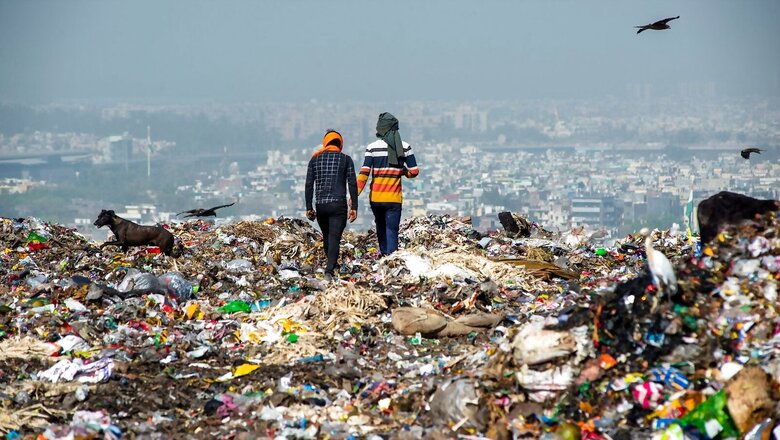
views
Plastic is toxic. It is clogging our cities, killing marine life, turning into an eyesore and getting increasingly cumbersome to get recycled. Despite all hazards, it still remains widely preferred for use — a habit that India has finally committed to challenge as it clears all decks to enforce its first major nation-wide ban on single-use plastic items.
Starting Friday, India joins countries across the world in signalling a cultural shift in the way citizens consume things which, if successful, could pave the way for a long-term transition to sustainable living. Despite its limitations and inclusion of only 19 items, experts hope, it could eventually make people mindful of “what” they buy and where it ends up — critical to fight against the plastic waste that pollutes our land, rivers and oceans.
As the ban comes into effect, it may not be just an ‘option’ for retailers or restaurants/cafes to dish out eatables and drinks in plates, knives, spoons, glasses, cups made of plastic. Instead, it may invite government action, which could lead to cancellation of their existing commercial licenses. A special task force formed in all states/UTs would ensure its implementation. Several states already have pre-existing bans on polyethylene bags, but they have been marred by shoddy implementation. This, however, will be the first such nation-wide ban following Prime Minister Narendra Modi’s clarion call to phase out single use plastic.
Punishable Offence
The Central Pollution Control Board (CPCB) has issued directions to all states and union territories to enforce the ban with immediate effect, and take action in case of any violation under Section 5 of the Environment (Protection) Act 1986 – under which offences are punishable with the imprisonment of up to five years or a fine up to Rs 1 lakh or both. Each state also has its own rules for violations. A SUP public grievance app has been launched to enable people to lodge complaints, with geo-tagged pictures to allow effective action.
The Plastic Waste Management (Amendment) Rules, 2021, prohibit the manufacture, import, stocking, distribution, sale and use of a notified list of single-use plastic items, including straws, plastic cutlery and candy sticks, packaging on sweet boxes, cigarettes packets, invitation cards, polystyrene and expanded polystyrene used for decoration. The ban also extends to carry bags made of virgin or recycled plastic bag with a thickness of less than 75 microns, and non-woven plastic carry bags made of propylene of less than 60 gram per square metre. It, however, excludes PET bottles – which is considered to contribute nearly 29% of total income of wastepickers.
Plastic packaging waste — perhaps the biggest contributor to pollution — which is not covered under the phase out of identified single use plastic items is required to be collected and managed in an environmentally sustainable way through Guidelines for Extended Producer Responsibility (EPR). Under this, producers, importers, brand owners, plastic waste processor manufacturers are required to register with CPCB and mandatorily reuse, recycle and ensure end of life disposal (such as road construction, waste to energy, waste to oil) of rigid plastic packaging material, flexible plastic packaging of single layer and multilayer plastic packaging, plastic sheet as well as carry bags made of compostable plastics.
National Control Room set up
The National Control Room set up at CPCB will monitor the effective implementation of the ban through state authorities, and provide assistance, guidance, clarification and information as may be sought by various stakeholders regarding ban on SUP items. It will be operational on all days till July 31. Similar control rooms will be set up across all states/UTs.
The Confederation of All India Traders Association (CAIT) has also announced a month-long awareness drive to educate over 40,000 traders across the country about the banned items. “We will also urge retailers to stop selling products in polybags, and also ask their wholesalers to not provide products with plastic packaging,” said CAIT secretary general Praveen Khandelwal, while also calling upon the government to rehabilitate thousands of workers from plastic manufacturing facilities which will be impacted by the ban.
According to the data maintained by pollution control bodies, during 2020-21 India generated over 41.2 lakh tonnes of plastic per annum, and estimated per capita plastic waste generation at 3 kg per year. Out of this, single-use plastic items contribute anywhere between 10 to 35 % to the total plastic waste.
As of June 30, there are a total of 683 units engaged in production of single-use plastic items with a cumulative capacity of 2.44 lakhs tonnes per annum (TPA) and operational capacity of 2.34 lakhs TPA. Under the ban, directions have been issued to all states to ensure the supply of plastic raw materials to units manufacturing the banned items, and revoke licences of those who are engaged in its production. By end of June, the consent to operate was revoked/modified for 433 of them.
Meanwhile, one-time certificates are being granted to manufacturers of compostable plastic and 194 certificates have been issued till date, and as many as 61 applications are in process. A total of 33 additional applications are pending with CPCB, which estimates compostable plastic production capacity at 3 lakh TPA, according to the government.
Read all the Latest News , Breaking News , watch Top Videos and Live TV here.




















Comments
0 comment